 Editor’s note: The Catholic News Herald offers these Advent reflections courtesy of Catholic Relief Services. These Advent reflections, activities and prayers invite us to prepare our hearts to welcome Emmanuel, “God with us” (Matthew 1:23), into our world at Christmas.
Editor’s note: The Catholic News Herald offers these Advent reflections courtesy of Catholic Relief Services. These Advent reflections, activities and prayers invite us to prepare our hearts to welcome Emmanuel, “God with us” (Matthew 1:23), into our world at Christmas.
These weekly reflections, based on the Gospel readings for each Sunday in Advent, connect the journey that brought Mary and Joseph to the stable with the journey of all those communities around the world that continue to encounter poverty.
At www.crs.org: More resources for your Advent journey, including videos, prayers and even a “digital Advent retreat”
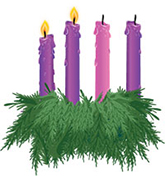 LIGHT THE ADVENT WREATH
LIGHT THE ADVENT WREATH
In the name of the Father, and of the Son, and of the Holy Spirit … Come Lord Jesus, be our light! May we learn to recognize You in our daily lives.
READ THE GOSPEL
Second Sunday of Advent (Cycle C) Luke 3:1-6:
“The word of God came to John the son of Zechariah in the desert.”
REFLECT WITH A STORY
Today’s Gospel is very specific. We are told the names of the ruling leaders of the government and the church, leaders like Tiberius Caesar, Pontius Pilate and Caiaphas. And we hear the names of the lands over which they ruled: Judea, Galilee and Abilene.
At first glance, all this information may feel unnecessary, even a bit overwhelming. It seems to take forever before we meet our main character, John the Baptist. Why all this information?
The Gospel is specific because God is specific. God works through the people, places and situations in our everyday lives. Each moment is a new opportunity to meet God – and God wants to be present to us in those very specific moments.
For Ana Maria Piedrahita – the founder of Sapia, an artisan group in Bogota, Colombia – God was at work in orange peels. In Colombia, where oranges grow in abundance and fresh-squeezed orange juice is very popular, many vendors have to pay someone to get rid of all those extra peels.
While Ana Maria was traveling, she saw a box made out of old orange peels. This inspired her to use orange peels to make fun, useful items. Ana Maria began gathering up all the orange peels she could find and turned them into jewelry and figurines. Soon her business grew and she was employing other people!
What began as a problem – too many orange peels! – now provides people with a way to earn money and support their families. Ana Maria’s story reminds us to take a deeper look at the ordinary events of our daily lives and to see God at work within them.
PRAY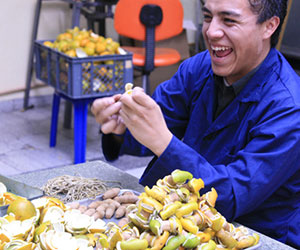 God of all people, help us to see
God of all people, help us to see
You in each moment of our day.
May we always remember that You come to us in the people, places and things we encounter. Amen.
REFLECT
Think about your own life: your family, your school, your work and your friends. How is God trying to talk to you?
ACT
This week, try to find the “orange peels” in your life. Pay attention to God’s presence in one person or situation.
GIVE
Instead of buying your family or friends toys for Christmas, why not give them an ethically produced gift made by someone like Ana Maria? Visit ethicaltrade.crs.org.

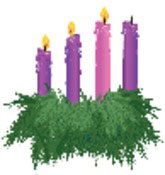 LIGHT THE ADVENT WREATH
LIGHT THE ADVENT WREATH
In the name of the Father, and of the Son, and of the Holy Spirit … Come Lord Jesus, transform our lives! Open our hearts and minds to experience joy as we serve our neighbors in need.
READ THE GOSPEL
Third Sunday of Advent (Cycle C) Luke 3:10-18:
“Whoever has two cloaks should share with the person who has none.”
REFLECT WITH A STORY
John the Baptist answers a familiar question in this week’s Gospel: “What should we do?”
How many of us ask ourselves this question when we see members of our global family living in poverty?
John provides a very simple answer. He tells us, “Whoever has two cloaks should share with the person who has none.” But John the Baptist does not stop there. In fact, as different people in the crowd question him – tax collectors, soldiers and more – he gives answers that are specific to each person. John recognizes that each of us has unique gifts to give – and unique needs based on where we are in our lives.
In the Holy Land, not far from where the angel Gabriel announced the birth of Jesus to the shepherds, a group of artisans carve beautiful nativity scenes out of olive wood. This is how Nawal Gharib provides for her family. The work she does is important – not just because it helps pay for food and other supplies, but because it allows her to share her God-given gifts with others.
Not so long ago, her workshop was dangerous. It was hard to breathe and see, which meant she and her fellow workers often got sick.
Now their workshop is healthy, clean and safe. “This is the best Christmas gift we have ever received,” says Nawal, with a big smile on her face. “Now we are working in a better place, a healthier place.”
What did she need? A safe place to work. Now Nawal and her family are able to ask the question, like the people asked John the Baptist, “What should we do?”
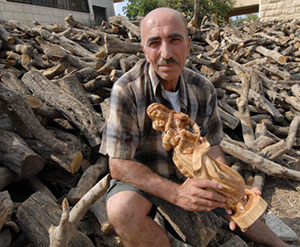 PRAY
PRAY
Jesus Christ, fill us with Your joy as we serve our brothers and sisters in need. May the joy You bring inspire us to care for each other as one human family. Amen.
REFLECT
How can I serve those in need in my community?
ACT
This week, choose some toys or household items – make sure they’re in good condition – and give them to a family in need.
Share what you have with others! Give a Catholic Relief Services Gift of Hope to a family in need this Christmas. Visit crs.org/gift-tree.
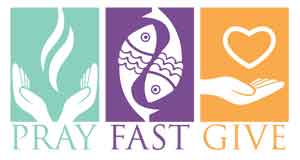 Although the word almsgiving does not come up much in regular conversation, Catholics hear it plenty during Lent since it is one of the three pillars of the church's Lenten practices along with prayer and fasting.
Although the word almsgiving does not come up much in regular conversation, Catholics hear it plenty during Lent since it is one of the three pillars of the church's Lenten practices along with prayer and fasting.
Although the three practices work together, almsgiving can sometimes get the short shrift because people might be more apt to pray and fast -- in private or at church -- than they might reach out to those in need.
The church defines almsgiving as donating money or goods to the poor and performing other acts of charity. The Catechism of the Catholic Church describes it as "a witness to fraternal charity" and "a work of justice pleasing to God."
There is plenty of biblical support for this practice in both the Old and New Testaments. In the Gospel of Matthew, Jesus urged his disciples not to brag about helping others saying: "When you give alms, do not blow a trumpet before you, as the hypocrites do in the synagogues and in the streets to win the praise of others."
An Old Testament passage puts almsgiving at the top of the Lenten practices: "Prayer with fasting is good. Almsgiving with righteousness is better than wealth with wickedness. It is better to give alms than to store up gold, for almsgiving saves from death, and purges all sin. Those who give alms will enjoy a full life" (Tobit 12:8-9).
Father John Riccardo, pastor of Our Lady of Good Counsel Parish in Plymouth, Michigan, takes the Bible passage at its word, saying: "I always think almsgiving atones for a multitude of sins."
"It's a simple way to respond. God's been generous to me; clearly I can do this with the poor," he told Catholic News Service March 1.
The priest, who hosts the radio program "Christ is the Answer" for Ave Maria Radio, in Ann Arbor, Michigan, said a good way to tie in almsgiving to fasting is by putting aside the money one might spend on a purchase not bought during Lent and give it to the poor.
Another idea, he said, is to make a conscious effort not to dodge those on the street looking for money but to pray that they will be put in your path and then be generous with them not only with money but by taking the time to look at them, ask them what their name is and tell them you will pray for them.
"Simple things like that are astounding, because they don't often hear their names," he said, stressing that Catholics should use the time of Lent to "be on the lookout for opportunities to be generous with the poor."
Paulist Father Larry Rice, director of the University Catholic Center at the University of Texas at Austin, says he encourages almsgiving with Catholic Relief Services' annual Rice Bowl program for Lent. College students don't use the Rice Bowl's cardboard box of old, which is still used in parishes around the country, but are more likely to use program's app which takes online donations because they "never carry cash," the priest said.
The Rice Bowl, now in its 42nd year, has been a Lenten staple to raise awareness about hunger and funds to combat hunger and poverty. Last year, more than 13,000 faith communities participated in the annual collection.
In a Lenten message posted on Ascension Presents website, Father Mike Schmitz, director of youth and young adult ministry for the Diocese of Duluth, Minnesota, stressed that donations to the CRS Rice Bowl should be more than spare change. Donations shouldn't be "leftovers," but cash, he said.
He also said almsgiving could take on forms other than just monetary donations and could even involve writing a note to someone different each day of Lent.
What's key, he said, is that almsgiving is "not about us" but about others.
— Carol Zimmermann, Catholic News Service

